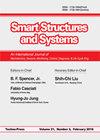A corrosion threshold-controllable sensing system of Fe-C coated long period fiber gratings for life-cycle mass loss measurement of steel bars with strain and temperature compensation
IF 2.2
3区 工程技术
Q2 ENGINEERING, CIVIL
引用次数: 0
Abstract
In this study, a corrosion threshold-controllable sensing system of long period fiber gratings (LPFG) is developed and validated for life-cycle monitoring of steel bars in corrosive environments. Three Fe-C coated LPFG sensors with two bare LPFG sensors in LP06 and LP07 modes for strain and temperature compensation were multiplexed and deployed inside three miniature, coaxial steel tubes to measure three (long-term in years) critical mass losses through the penetration of tube walls and their corresponding (short-term in hours) corrosion rates in the life span of steel bars. The strain/temperature and mass loss measurements are based on the changes in grating period and refractive index of surrounding medium, respectively. Thermal/mechanical loading and accelerated corrosion tests were conducted to validate the functionality, sensitivity, accuracy, and robustness of the proposed sensing system. Since both the steel tube and Fe-C layer represent the material composition of steel bars in the context of corrosion, the mass loss correlation among any two of the steel tube, Fe-C layer and steel bar is independent of the test conditions such as the current density and sample length, and thus applicable to engineering practices. The outer tube can notably delay and decelerate the corrosion process of its inner steel tube due to the reduced current effect.一种具有应变和温度补偿的铁碳涂层长周期光纤光栅腐蚀阈值可控传感系统
在本研究中,开发并验证了一种用于腐蚀环境中钢筋全生命周期监测的长周期光纤光栅(LPFG)腐蚀阈值可控传感系统。三个Fe-C涂层LPFG传感器和两个裸LPFG传感器在LP06和LP07模式下进行应变和温度补偿,并将其多路复用并部署在三个微型同轴钢管中,以测量穿透管壁的三个临界质量损失(长期以年为单位)及其相应的(短期以小时为单位)腐蚀速率。应变/温度和质量损失的测量分别基于光栅周期和周围介质折射率的变化。进行了热/机械载荷和加速腐蚀试验,以验证所提出的传感系统的功能、灵敏度、准确性和鲁棒性。由于钢管和Fe-C层都代表了钢筋在腐蚀情况下的材料组成,因此钢管、Fe-C层和钢筋之间的质量损失相关性与电流密度、试样长度等试验条件无关,因此适用于工程实践。由于电流效应的减小,外管可以显著延缓和减缓内管的腐蚀过程。
本文章由计算机程序翻译,如有差异,请以英文原文为准。
求助全文
约1分钟内获得全文
求助全文
来源期刊

Smart Structures and Systems
工程技术-工程:机械
CiteScore
6.50
自引率
8.60%
发文量
0
审稿时长
9 months
期刊介绍:
An International Journal of Mechatronics, Sensors, Monitoring, Control, Diagnosis, and Management airns at providing a major publication channel for researchers in the general area of smart structures and systems. Typical subjects considered by the journal include:
Sensors/Actuators(Materials/devices/ informatics/networking)
Structural Health Monitoring and Control
Diagnosis/Prognosis
Life Cycle Engineering(planning/design/ maintenance/renewal)
and related areas.
 求助内容:
求助内容: 应助结果提醒方式:
应助结果提醒方式:


